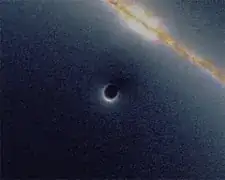Gravitational lensing occurs when light from a distant object is bent as it travels to an observer, due to passing through the gravitational field of a massive object (such as a galaxy, or black hole).
Gravitational lensing occurs when light from a distant object is bent as it travels to an observer, due to passing through the gravitational field of a massive object (such as a galaxy, or black hole).
Spacetime around a massive object (such as a galaxy cluster or a black hole) is curved, and as a result light rays from a background source (such as a galaxy) propagating through spacetime are bent. The lensing effect can magnify and distort the image of the background source.
